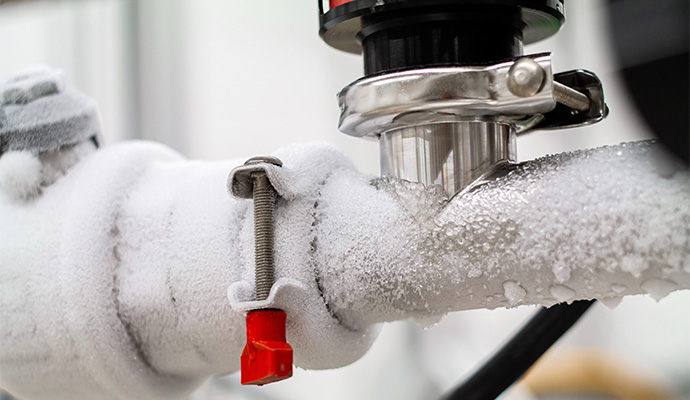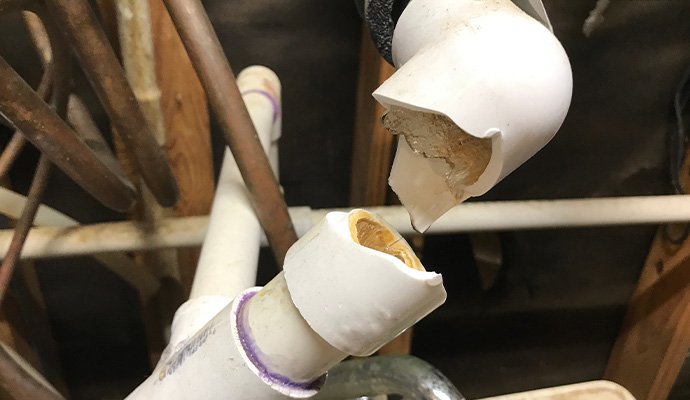“Following a devastating fire, Dayspring’s ability to pull resources from all over the state within hours was incredible. They had over 50 workers onsite within 2-3 hours! We would never have been able to have our students back in school within 2 days were it not for the quick response and the quality of work provided by them. Their quality of work was excellent!”
Frozen Pipes: Causes, Prevention, and Solutions
Frozen pipes can be a major headache for homeowners during the winter months. From causing water damage to disrupting daily routines, dealing with frozen pipes can be a frustrating experience. In this article, we will discuss the causes of frozen pipes, prevention tips, and solutions to effectively deal with this common winter issue.

Causes of Frozen Pipes
- Low Temperatures: When temperatures drop below freezing, water inside pipes can freeze and expand, leading to potential blockages.
- Poor Insulation: Pipes located in unheated or poorly insulated areas such as attics, basements, or crawl spaces are more susceptible to freezing.
- Lack of Heating: Inadequate heating or drafts near pipes can contribute to them freezing.

Tips on How to Prevent Frozen Pipes
- Insulate Pipes: Adding insulation to vulnerable pipes can help prevent them from freezing. Use pipe insulation sleeves or wrap pipes with heat tape.
- Keep Interior Temperatures Consistent: Maintain a consistent temperature in your home, especially during cold weather. Opening cabinet doors to allow warm air to circulate around pipes can also help.
- Allow Faucets to Drip: Allowing faucets to drip slowly can relieve pressure and prevent pipes from freezing.
- Seal Leaks and Cracks: Inspect your home for any leaks or cracks that may expose pipes to cold air. Seal these areas to keep pipes protected.
Solutions for Frozen Pipes
- Thawing Pipes: If you suspect a pipe is frozen, you can attempt to thaw it using a hairdryer, heating pad, or towels soaked in hot water. Avoid using open flames or high-temperature heating devices.
- Call a Professional: If you are unable to thaw the pipes yourself or if you suspect a more serious issue, it is best to contact a licensed plumber for assistance.
- Preventative Measures: Once the pipes are thawed, take steps to prevent them from freezing again by implementing the prevention tips mentioned above.
Problems Associated with Burst Pipes
Water damage from burst pipes can lead to a variety of problems, including extensive property damage, mold growth, and compromised structural integrity of the home[1]. When a pipe bursts, it can release a significant amount of water into the surrounding area, causing damage to walls, floors, and personal belongings. This water damage can be especially severe if not addressed promptly, leading to costly repairs and restoration efforts.
Moreover, water from burst pipes can create ideal conditions for mold and mildew growth[2]. Mold not only damages surfaces and materials but also poses health risks to occupants of the affected property. The presence of mold can exacerbate respiratory issues and allergies, making it crucial to address water damage from burst pipes promptly and effectively.
Additionally, the structural integrity of the home can be compromised by water damage from burst pipes. Saturated materials such as drywall and wood can weaken over time, potentially leading to structural issues within the property. Ignoring water damage from burst pipes can result in long-term consequences that may require extensive renovations to rectify.
In conclusion, the problems associated with water damage from burst pipes extend beyond surface-level damage and can have lasting effects on the property and its occupants. Timely and proper mitigation of water damage is essential to prevent further issues and ensure the safety and integrity of the home.
Summary of What to do When Pipes are Frozen
Dealing with frozen pipes can be a frustrating and inconvenient experience, but with the right knowledge and preventative measures, you can minimize the risk of pipes freezing in your home. By understanding the causes, implementing prevention tips, and knowing how to effectively thaw frozen pipes, you can protect your home and prevent water damage during the winter months.
When a frozen pipe bursts, it can release a significant amount of water into the surrounding area, causing damage to walls, floors, and personal belongings. Water damage from burst pipes can lead to a variety of problems, including extensive property damage, mold growth, and compromised structural integrity of the home.
Remember, it's always important to take necessary steps to safeguard your pipes before the cold weather sets in. Stay proactive and prepared to avoid the hassle of dealing with frozen pipes in the future.
Sources:














